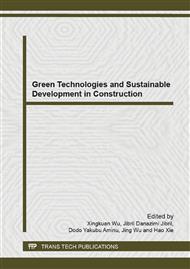p.277
p.281
p.285
p.289
p.293
p.297
p.302
p.307
p.312
Development of Local Weighting Factors in the Context of LCIA
Abstract:
Life Cycle Impact Assessment (LCIA) is a phase of the Life Cycle Assessment (LCA) in order to quantify various environmental impacts based on the inventory analysis. Weighting although is not the mandatory element of LCIA is the element in which local data becomes important. Potential environmental impacts and the importance of particular impacts can be quite significant among the countries or regions. Determination of the importance degree is possible by weighting of the selected environmental impact categories. Therefore, this study aimed to develop local weighting factors (WFs) by taking the environmental issues into consideration for the building materials produced in Turkey. And 11 environmental impact categories such as global warming, ozone depletion, acidification, photochemical ozone formation, eutrophication, fossil fuel depletion, mineral resource depletion, water depletion, land use, indoor air quality and waste were selected considering environmental impacts caused by the building materials and environmental issues in Turkey. And WFs of these categories for Turkey were determined by using a panel approach. Thus, it can be possible to assess environmental impacts of building materials by using local data.
Info:
Periodical:
Pages:
293-296
DOI:
Citation:
Online since:
May 2014
Authors:
Keywords:
Price:
Сopyright:
© 2014 Trans Tech Publications Ltd. All Rights Reserved
Share:
Citation:


